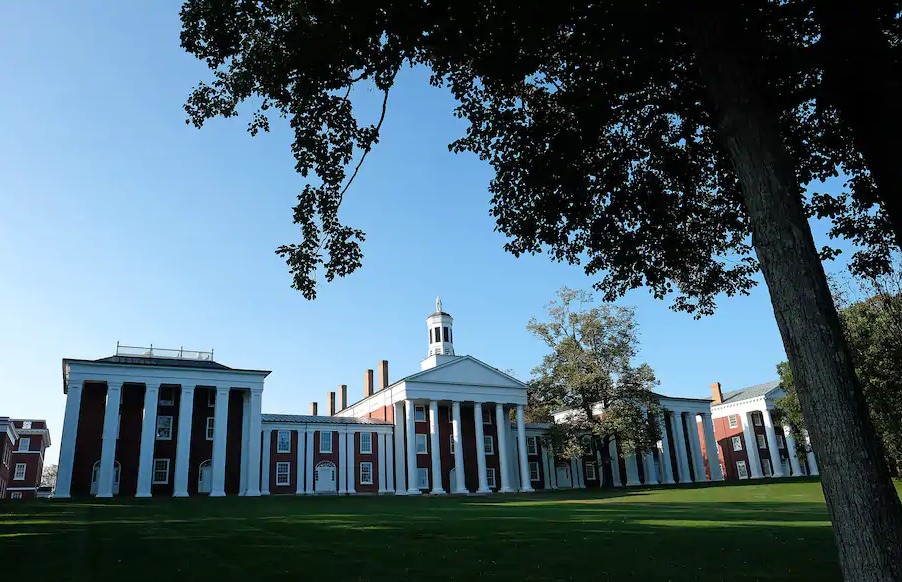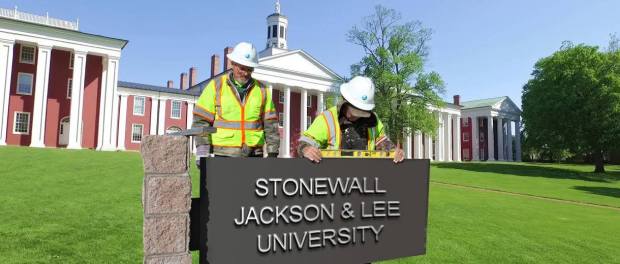Why KEEP THE NAME Lee in Washington and Lee University
Posted By : manager
Posted : November 22, 2020
By: Philip Leigh
(November 15, 2020) This past summer a Washington & Lee journalism Professor wrote an article for The Nation urging that her school drop the Lee name because he was “a man who acted dishonorably throughout his life.” Such an overstatement may be dismissed by equally exaggerated interpretations from the opposite perspective in order to emphasize the hyperbole. The first paragraph of The Nation article complains of the symbols in the campus chapel that reek “of the lies of the Lost Cause myth” and are amplified by the “enduring stench” that comes from the buried “bones of the slave-owning Lee family.”
By turning the tables one might want to honor the chapel with the Lee name for containing the bones of the slave-emancipating Lee family. The General freed the few slaves he owned personally several years before the Civil War began, according to son Robert, Jr. During most of his prior life Lee was on military duty and had little use for slaves. Simultaneously, his wife had access to all the servants she needed from her father, George Custis, who owned over a hundred slaves. Lee’s slaveholding situation prior to the War was much like that of Ulysses Grant who worked the slaves owned by his father-in-law and owned at least one personally for a time. By the end of 1862, however, the Lee family apparently did not own any slaves. The last had been set free more than two years before the war ended, which was not true of Grant’s family. Similarly, the South’s reverence for Lee was not a myth that emerged after the Civil War as implied by the Lost Cause allusion. No commander, North or South, was more beloved by his troops during the war than was Robert E. Lee.
Consider the prof’s accusation that Lee’s postbellum reputation as a “proponent of reconciliation between North and South” is a product of “revisionist history and an effective PR machine.” That’s a stretch requiring a bungee cord. Only four months after he surrendered his army, he wrote Washington College to accept their offer to make him President as follows:
I think it the duty of every citizen in the present condition of the country to do all in his power to aid the restoration of peace and harmony, and in no way to oppose the policy of the state or general [Federal] governments, directed to that object. It is particularly incumbent on those charged with the instruction of the young, to set them an example of submission to authority.
The prof follows by condemning Lee’s sin of fighting for a nation whose goal was to promote slavery. That accusation is an absurdity for two reasons. First, Lee made it clear that his first loyalty was to Virginia, not to her status as a slaveholding state. Second, like the other three states of the upper-South, Virginia did not secede to promote slavery. She seceded only after President Lincoln started organizing an army to coerce the seven states of the lower South back into the Union against their will. Virginia had warned Lincoln that she believed coercion to be unconstitutional and would fight to prevent it. Seventy-three years earlier when they ratified the U.S. Constitution, Virginians pointedly reserved the right to withdraw from the new government “whenever the powers granted unto it should be perverted to their injury or oppression.”
Next the prof adds that W&L must drop the Lee name “as people rise up around the world to protest institutional racism.” I don’t contest the incidents of lawless uprisings and vandalism, but I require that she prove her premise of institutional racism in America. More blacks voted against the Democrats in the past election than ever, notwithstanding that Party’s pledge to fight so-called systemic racism. It is hard for America to have systemic racism when her institutions, such as academia, the media, Hollywood, Big Tech, the Deep State and even Corporate America endorse BLM and so-called Diversity of gender and skin color agendas. Meanwhile the diversity of thought is practically non-existent as evidenced by campus censorship of speakers who will defend Robert E. Lee. In fact, the only legally sanctioned racism in America today is affirmative action which favors blacks over other minorities such as Asians and Ashkenazi Jews, among others. Although there will always be racists among us, systemic racism is extinct or a mere vestige.
The journalist follows with an accusation that Lee does not merit his reputation as an educator. She instead attributes W&L’s reputation to “the thousands of faculty, students and staff” who followed him. She ignores the contributions from generations of Confederate veterans, their descendants and others who endorse W&L’s traditional values including those planted and nurtured by General Lee. He even started the journalism school where she is employed. What is lacking is not Lee’s contributions, but the professor’s gratitude.
Lee’s name should also be dropped, she argues, because he was a traitor as well as a racist. In truth, he was never convicted of treason and even Confederate-hostile historian Allen Guelzo (who will be speaking at W&L in January) admits that Lee would likely have won his day in court based upon a defense of being a Virginian first and American second. As for racism, consider that prominent Northerners such as Abraham Lincoln were racist by today’s standards based upon a number of quotes including one during the 1858 Lincoln Douglas Debates: “ I am not, nor ever have been, in favor of bringing about the social and political equality of the white and black races. . . And inasmuch as . . . there must be the position of superior to inferior . . . I as much as any other man am in favor of having the superior position assigned to the white race.”
Eventually the prof fabricates a straw man by observing that Lee did not originate W&L’s honor system. Like nearly all schools, Washington College had an honor system before Lee arrived, but the General transformed it by giving the students ownership of the pledge. The impact is reflected in his answer to a freshman student who asked that he provide a list of rules for students. Lee responded, “We have but one rule here and it is that every student must be gentlemen.” Encompassed in that solitary statement is the implication that the students must be beyond courteous; they must never lie, cheat or steal, or tolerate anyone who does.
She next accuses Lee of panicking when he applied for amnesty in June 1865 under the terms announced by President Andrew Johnson. She asserts that Lee’s application was a petrified response to a treason indictment. Although he first verified with General Grant that the Appomattox surrender terms were intended to exempt him from government persecution, the journalist implies that Lee was using a good-old-boys network to evade conviction because both Grant and Lee were West Point graduates. In reality, Lee wanted to set an example of reconciliation for other Confederate soldiers as exemplified in the following story:
Amnesty required a new allegiance oath. Friction resulted from efforts to ram the oath down everybody’s throat at once. Captain George Wise was called before the Provost to take the oath.
“Why must I take it?” he asked. “My parole covers the ground. I will not.”
“You fought under General Lee, did you not?”
“Yes. And surrendered with him and gave my parole. To require this oath of me is to put an indignity upon me and my general.”
“I will make a bargain with you, Captain. Consult General Lee and abide by his decision.”
The Captain went to the Lee residence and told the General, “They want me to take this thing, General,” extending a copy of the oath. “My parole covers it, and I do not think it should be required of me. What would you advise?”
“I advise you to take it,” said Lee quietly. “It is absurd that it should be required of my soldiers, for, as you say, [General Grant’s Appomattox parole] covers it. Nevertheless, take it, I should say.”
“General, I feel that this is submission to an indignity. If I must continue to swear the same thing over at every street corner, I will seek another country where I can at least preserve my self-respect.”
After a moment’s silence General Lee said quietly, “Do not leave Virginia. Our country needs her young men now.”
When the Captain told his father, Henry A. Wise, that he had taken the oath, the ex-governor shouted: “You have disgraced the family!”
“But, General Lee advised me to do it.”
“Oh, that alters the case. Whatever General Lee says is all right, I don’t care what it is.”
Beyond the Wise story, however, Lee demonstrated his courage when prosecutors were preparing a treason case (never tried) against Confederate President Jefferson Davis. When questioning the General they asked a series of questions that attempted to get Lee to admit that his actions were taken at the bidding of President Davis. Even though the prosecutors were hinting that it might immunize him from prosecution, Lee declined to take the bait. He replied, “I am responsible for what I did, and I cannot now recall any important movement I made which I would not have made had I acted entirely on my own responsibility.”
Finally, consider a thought experiment developed by a Princeton professor. According to Law Professor Robert George, nearly all his students declare that they would have been abolitionists had they lived in the South in the late 1850s. But he shows that only the tiniest fraction of them, or any of us, would have spoken out against slavery, or lifted a finger to free the slaves. Most of them—and us—would have gone along. Many would have supported the slave system and happily benefitted from it.
He tells the students that he will credit their abolitionist claims if they can show that in leading their present lives they have stood up for the rights of unpopular victims of injustice and where they have done so knowing:
- They would be loathed and ridiculed by powerful individuals and institutions in our society and;
- They would be abandoned by many of their friends and;
- They would be shouted down with vile names and;
- They would be denied valuable professional opportunities as a result of their moral witnessing and;
- They might even lose their jobs after such witnessing.
In short, he challenged the students to show where they have—at risk to themselves and their futures—stood up for a cause that is unpopular within the elite sectors of today’s society. It’s a revealing challenge to students but would be even more illuminating if applied academic historians and journalists. It evokes the ancient wisdom, “Courage is the rarest of virtues.”
Readers can order signed copies of my new book, Causes of the Civil War, for $25. They may be purchased with credit card, PayPal, or check. If you’d like a copy email me: phil_leigh(AT)me.com. I will pay for shipping. Please provide your postal address. Unsigned copies are available at Amazon for $22.
Visit my Amazon Author Page to see the rest of my books.

